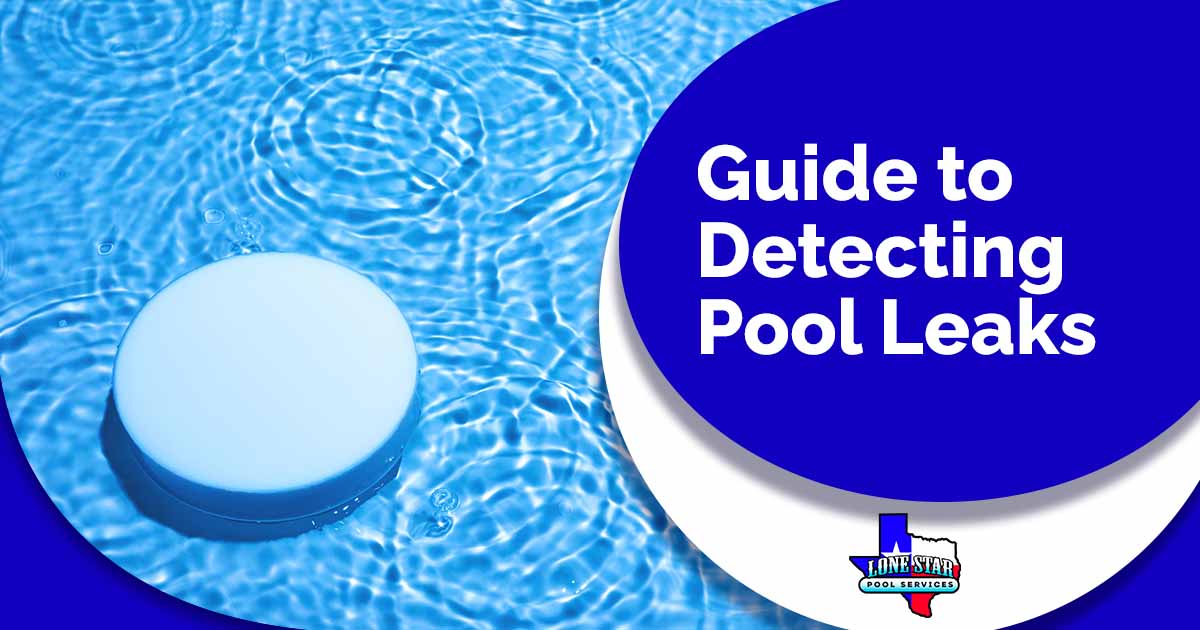Detecting pool leaks is much more involved than just looking for dripping water around your pool. The leak can have many different sources that will impact how it is repaired and how much it will cost.
Pool leaks can happen anywhere inside or outside your pool. If you suspect water is leaking, check your pool filter system first. For in-ground pool owners, it’s important to know that cracks can occur in underground piping. This is a job that’s reserved for the professionals. The team at Lone Star Pool Services can test the lines for possible cracks and determine whether there is a leak.
When it comes to detecting pool leaks, there are several things you can do to see what’s going on with your pool:
Use the Bucket Method
Many people like the bucket method for detecting pool leaks because it’s easy to do and requires little equipment. Take a 5-gallon bucket and put it on the second step of your pool. Next, fill the bucket with enough water to match the pool’s water level. Mark the level with duct tape on the inside of the bucket. Turn off any pumps and wait 24 hours. When the 24 hours is over, compare the pool water level to the amount of water in the bucket. If both are lower but even, your water loss is due to evaporation.
But, if the pool level is lower than the water level in the bucket, there’s a good chance you have a leak. Repeat the test, but leave the pump on this time. When you check the new results, see if the water level in the pool is greater with the water circulating under pressure. If it is, the leak could be coming from your pool’s plumbing.
Use the Ink Method
This method requires more equipment and can be a bit more involved. You’re going to need goggles, a snorkel, and either leak finder dye or red or dark food coloring. Before putting any dye or going in the pool, check the area around and the ground for any wetness. This will let you know the general area where the leak may be coming from. Once you have a general idea it’s time to dive in!
Squirt some dye in the water close to the wall. If the leak is nearby, the dye will move closer to the source of the leak. If you think the leak is coming more towards the bottom, put your goggles and snorkel on and try the dye test underwater. Look for how the water is moving to pinpoint the source.
Determine When the Pool is Leaking
When you’re detecting pool leaks, it’s important to know when the pool is leaking. Just because it is leaking doesn’t mean it’s happening 24/7. First, determine if the pool is only leaking when equipment, like the pump, is on. If it is, you could have a pressure-side return leak on your hands. When the filter pump is on, the plumbing on the pressure side is under pressure and can open up small drips.
As you’re determining whether the pool is only leaking when the equipment is on, check the backwash line for water that is constantly running. Check for soft or wet spots in the yard on the side of the pool where the hoses and plumbing bring water back to the pool. Any of these circumstances can indicate that the pool is only leaking when the equipment is on.
If the pool is only leaking when the equipment is off, you may have a suction-side leak involving the pipes that bring water from the pool. You may notice air in the pump basket, or air bubbling out of the return lines. Use duct tape to mark water levels so you can see how much water is leaking.
Check the Equipment Pad
Look at the area around the filter, pump, heater, and valves. If you notice any moisture, there could be a leak. When you turn the pump on and off, look for any water that is spraying. This can also help you determine the source when detecting pool leaks.
Check to See if the Water Stabilizes Anywhere
Close the skimmer valve and let the water level drop below the skimmer while running the pump on the main drain. If the water level still drops you know there is a leak but that the skimmer is likely not to blame.
Call the Professionals When Detecting Pool Leaks
If it seems as though there’s a lot of work that goes into detecting pool leaks it’s because there is! Besides putting a bucket in to test water levels, many of the other methods are time-consuming. Who wants to spend their free time playing the role of a pool technician? Wouldn’t it be better to call a professional, get the job done right the first time and spend your free time doing the things you enjoy?
Calling Lone Star Pool Services & Maintenance can make that happen. We can detect pool leaks and repair them for you. Whether the leak is big or small, our experienced technicians will diagnose the problem and give you an estimate when it comes to the amount of work and time and it would take to fix it. You’ll find that we have an honest team of technicians who want to get the job done right.
While some pool leaks may appear suddenly, there are many times when leaks develop over time. Investing in weekly pool service can help to detect these leaks earlier rather than later when they are bigger and more expensive. Lone Star Pool Services & Maintenance can set up a cleaning service schedule that works for you and your budget. This way you have peace of mind that your pool is clean and that professionals are checking it regularly for any damage.

